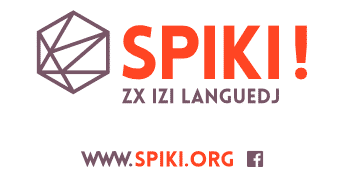History and comparative degree of the universal languages.

Estimated positioning of the universal languages
Discover Spiki the easiest universal language !
English
English
400
Mother tongue: 350 million speakers
Foreign language: approximately 1 billion speakers
De facto the language used in all the international exchanges.
Relatively simple language spoken in the United States and in the countries of the Commonwealth.
End of the 19th century
Universal glot
1868
Objective: international language
Vocabulary from latin and french
One of first attempt of universal language
www.en.wikipedia.org/wiki/Universalglot
Volapük
1879
Objective: international language
Approximately 150 000 speakers in the 1880s.
Vocabulary from latin, german and english
Complex vocabulary and grammar
www.en.wikipedia.org/wiki/Volapük
improved Volapük :
Idiom Neutral, 1902
www.en.wikipedia.org/wiki/Idiom_Neutral
Spokil, 1904
www.en.wikipedia.org/wiki/Spokil
Mundolingue
1890
Objective: international language
Vocabulary from latin
www.fr.wikipedia.org/wiki/Mundolingue
Esperanto
1887
Objective: international language
Approximately 1 000 000 speakers
The winner of the battle of world languages.
Indo-european vocabulary
Relatively complex grammar
Principles used by the Spiki :
- 1 letter 1 sound
- Defined article
www.en.wikipedia.org/wiki/Esperanto
improved Esperanto :
Ido, 1907, approximately 3 000 speakers
www.en.wikipedia.org/wiki/Ido_(language)
Zilengo
1889
Objective: international language
Created by a Japanese
Close to Esperanto. Abandoned for the Esperanto.
www.fr.wikipedia.org/wiki/Zilengo
Bolak
1899
Objective: international language between "civilized" peoples.
Vocabulary built from the evocation of the tone of all the combinations of possible words.
Abandoned for the Ido.
www.en.wikipedia.org/wiki/Bolak_language
The 20th century
Latino sine flexione
1903
Objective: international language
Latin with simplified grammar
www.en.wikipedia.org/wiki/Latino_sine_flexione
Occidental or Interlingue
1922
Objective: Esperanto competitor
Vocabulary from latin
www.en.wikipedia.org/wiki/Occidental_language
Interlingua
1924
approximately 3 000 speakers
Objective: attempt of an irregular language
Greco-Latin and international vocabulary
Irregular grammar
www.en.wikipedia.org/wiki/Interlingua
Novial
1928
Objective: international language
Vocabulary from latin and german languages
Complex grammar
www.en.wikipedia.org/wiki/Novial
Neo
1937
Objective: international language
Grammar close to the esperanto
Vocabulary close to latin and spanish
Words very shorts
www.en.wikipedia.org/wiki/Neo_(constructed_language)
Interglossa / Glossa
1943
Objective: international language
Indo-european vocabulary
Logical language
Vocabulary reduces to 880 words
www.en.wikipedia.org/wiki/Interglossa
Loglan / Lojban
1987
Objective: international language + communication with computers
Vocabulary from english, arabian, chinese, spanish, hindi and russian
Logical language
www.en.wikipedia.org/wiki/Lojban
Elefen
1998
Objective : international language
Vocabulary from spanish, portuguese, french, italian...
22 letters without phonetic exeptions
Easy to read if we know spanish or french
www.elefen.org
Sambahsa
2007
Objective: international language
Grammatical simplification of Proto Indo-european, the language which would be at the origin of all the Indo-European languages
www.en.wikipedia.org/wiki/Sambahsa
The asian
Lingua sistemfrater
1957
Objective: international language
Created by a Vietnamese
European vocabulary
Grammar simplified from Asian type
www.en.wikipedia.org/wiki/Lingua_sistemfrater
Kotava
1978
Objective: International language less like Occdental languages
Completely new vocabulary
www.fr.wikipedia.org/wiki/Kotava
Noxilo
1997
Objective: International language less like European languages
Created by a Japanese
Reversible organization Subject Objet Verb (japanese) or Subject Verb Object (english, french...)
www2s.biglobe.ne.jp/~noxilo/
The European construction
Uropi
1986
Objective: common language for Europe
Indo-european vocabulary
Simplified grammar similar to english
www.en.wikipedia.org/wiki/Uropi
Eurolang
1995
Objective: common language for European Union
Easy to read if you know 2 or 3 languages of construction (English, French, Spanish, Italian and German).
www.simple.wikipedia.org/wiki/Eurolang
The unclassifiable
Solresol
1862
Objective: international language
Language compound only with the 7 musical notes
www.en.wikipedia.org/wiki/Solresol
Láadan
1982
Objectif : Test of the hypothesis that the languages male-centered limit the expression of the women.
Vocabulary from english and navajo
www.en.wikipedia.org/wiki/Láadan
Toki Pona
2001
Objective: test a language of an extreme simplicity
Aproximately 50 speakers
Only 123 words
14 letters
Principles used by the Spiki :
- Association of several simple words to create a complex word
www.en.wikipedia.org/wiki/Toki_Pona
Remaï
2007
www.davonline.com/newlangues2012/UK_A1_101p01.html
Simplified English and French
Petit-Nègre
Aproximately 1916
Objective: communicate with the peoples and the soldiers from the French colonies
Simplified grammar and synthaxe
Principles used by the Spiki :
- Infinitive for the conjugated verbs
www.fr.wikipedia.org/wiki/Petit_nègre
Basic English
1940
Objective: train the peoples and the soldiers from britannic colonies
Subset of 850 words of English
Principles used by the Spiki :
- Reduction of the vocabulary
www.en.wikipedia.org/wiki/Basic_English
Newspeak
1949
Objective: Question about the simplification which becomes censorship. Example: if the word freedom does not exist any more, this concept can disapear.
Simplified English
Imaginary language invented by George Orwell in the novel 1984
Principles used by the Spiki :
- Le pluriel est toujours marqué par un s
- Les verbes se conjuguent tous de la même manière
- Pas de synonymes
- Pas d'exception
- Not devant un mot pour dire son contraire
- The plural is always marked by s
- The verbs are conjugated all in the same way
- No synonyms
- No exceptions
- Not in front of a word to say its opposite
www.en.wikipedia.org/wiki/Newspeak
Special English
1959
Objective: understanding by the foreigners of the radio of the American government Voice of America
Subset of 2 000 words of English
Principles used by the Spiki :
- A part of the dictionary (Spiki is more impartial)
- Slow diction
- No idiomatic forms
www.en.wikipedia.org/wiki/Special_English
Simplified Technical English
1980
Objective: standardize the technical documents of the aircraft industry.
Standardized English
Approximately 1 000 approved words
Principles used by the Spiki :
- A word has only 1 grammatical function
- A word has only 1 sense
- Only the simple times are accepted
www.en.wikipedia.org/wiki/Simplified_Technical_English
Globish
2004
Objective: English naturally spoken by the foreigners. Globish is a commercial project.
Subset of 1 500 words of English
www.en.wikipedia.org/wiki/Globish_(Nerriere)
Esata
Objective: Standardize the English Creoles
Spiki!
Spiki!
2014
Objective: simple international language
Vocabulary from l'anglais
700 words
Minimal grammar
www.spiki.org



